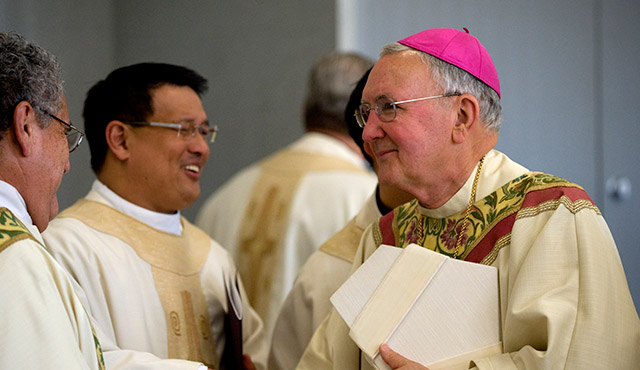The ancient Greek axiom “Know thyself” surely applies to what the United States Conference of Catholic Bishops has to say about, well, bishops: “As successors of the Apostles and teachers of the Church, the bishops have the duty to hand on what God has revealed to us and to encourage all members of the Church to deepen their understanding of the mystery and gift of the Eucharist.”
What it doesn’t mention, however, is a bishop’s role as administrator, teacher, scholar, motivator, and, when appropriate, cheerleader. Above all else, a bishop must be an effective leader and a humble follower: the former of his diocese, the latter of Jesus.
Shockingly, the governing body’s description never mentions juggling. That’s right, juggling. With an endless supply of faith and dedication, bishops must often juggle all of the aforementioned roles during the normal course of a day. It’s not an easy task, but it’s a noble calling.
Billy Graham once said, “The greatest legacy one can pass on … is not money or other material things accumulated in one’s life, but rather a legacy of character and faith.”
Character. Faith. These two words come to mind when pondering the lives and work of The Most Rev. Tod Brown and The Most Rev. Dominic Luong, two men who gave so much for the Diocese of Orange. After decades of service, Bishop Brown relinquished his role four years ago, Bishop Luong just last year.
They may be retired, but they are by no means inactive.
Bishop Tod Brown
Starting a new business requires long hours and “sweat equity,” but shepherding that same business through a period of explosive growth requires vision and dedication. Though not a business (financial staff may argue otherwise), the Diocese was led by Bishop Tod Brown through a period of tremendous expansion, doubling in size to 1.2 million followers during his 14 years as bishop. And recognizing the county’s growing diversity, during his first Mass he thanked the congregation in English, Spanish, Vietnamese, Tagalog and Korean.
Although Bishop Brown has retired, his labor of love continues.
“Before I retired,” he says, “I mapped out a plan for myself to assist Bishop Vann [his successor] any way I could.” Along with his religious-dialog and ecumenical work (as bishop, he stressed the importance of interreligious and ecumenical relationships), “I like to be involved with some kind of outreach to the poor. I like to stay busy.”
Busy, indeed. Just last week, at St. Columban Church in Garden Grove, he anointed ill patients with holy oil and blessed the hands of caregivers with holy water brought from Lourdes, France.
“Caring for the sick and infirm is the ministry we are all called to as Christians,” Bishop Brown said in a Jan. 30 Orange County Catholic news item. “As a society, many of the dedicated people who care for the most vulnerable are not given the appreciation their service merits.”
Transition into retirement wasn’t easy at first. “[It] really took an adjustment, about a year or two,” he says, emphasizing the importance of retirement planning. “It’s a different kind of lifestyle.”
That lifestyle includes worldwide travel. He has been to France, Italy, Vietnam and Hong Kong, among other locales.
“I’m happy to be able to stay busy and have more say in what I do and when I do it,” Bishop Brown says. “It’s nice to have more control over my time. I’m really enjoying my retirement.”
Bishop Dominic Luong
Ponder what life must have been like for Dominic Luong when he came to the U.S. from Vietnam to study for the priesthood. Imagine the culture shock, the language barrier, the expectations of a devoutly Catholic family halfway around the world.
Now imagine taking all of this on at age 16.
So by 1975, nine years after his ordination, then-Father Luong was a tremendous resource for the thousands of refugees who flooded in to the U.S. after the fall of South Vietnam. An archbishop convinced him to move to New Orleans, where a large portion of the Vietnamese arrived.
Years later, Bishop Tod Brown petitioned the Vatican for a much-needed second auxiliary bishop, since thousands of the Vietnamese refugees had also settled in Orange County, as well. The once-wide-eyed 16-year-old immigrant was appointed the first native-born Vietnamese Roman Catholic bishop in the U.S.
These days, “Retirement is great, because I have more time for myself.”
Still active in the Church, he’s writing a book, “Mary of Vietnam.” “It’s about the many places Our Lady has appeared there. Each sighting has produced a different, unique message.
“I’m also involved in a Lectio Divina [‘Divine Reading’] group,” Bishop Luong adds. “We get together every month, have Eucharistic adorations and celebrate the liturgy. And every year, during Lent, we go on a four-day monastery retreat.”
He remains active at St. Bonaventure, in Huntington Beach. “It has a strong Vietnamese community,” he says. “I like to keep in contact with my people.”
Although Bishop Luong would like to embark on pilgrimages throughout the world, “Now my health does not allow travel so much,” he says. “But I did visit pilgrimage sites in Krakow [Poland], the birthplace of Pope Saint John Paul II.”
Given Bishop Luong’s decades of service to the Church, and to refugees far and wide, the words he chose for his Coat of Arms speak volumes.
“My motto is, ‘You are Strangers and Aliens No Longer,’” he says.

